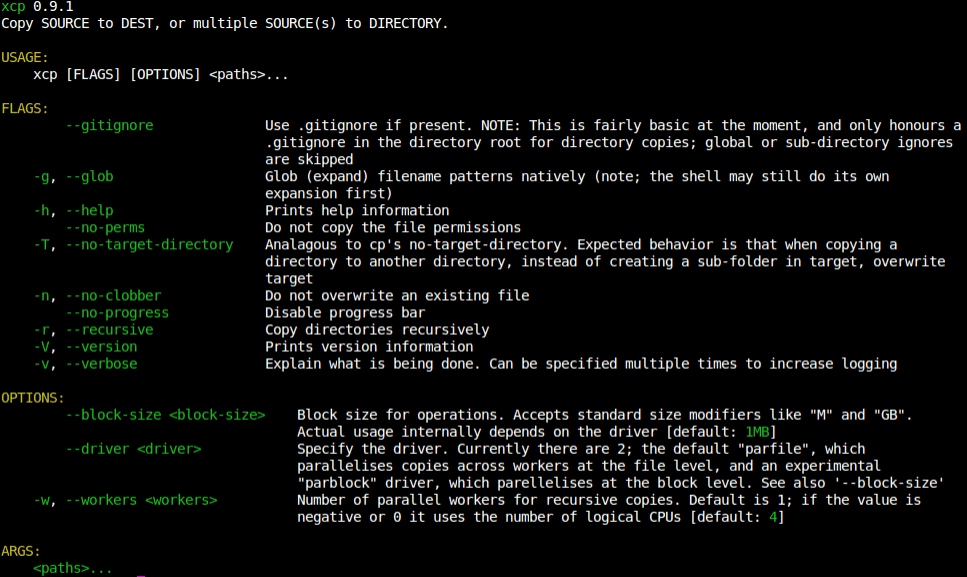xcp is a (partial) clone of the Unix cp command.
It is not intended as a full replacement, but as a companion utility with some more user-friendly feedback and some optimisations that make sense under certain tasks.
This is free and open source software.
Features include:
- Displays a progress-bar, both for directory and single file copies. This can be disabled with –no-progress.
- On Linux it uses copy_file_range call to copy files. This is the most efficient method of file-copying under Linux; in particular it is filesystem-aware, and can massively speed-up copies on network mounts by performing the copy operations server-side. However, unlike copy_file_range sparse files are detected and handled appropriately.
- Optimised for ‘modern’ systems (i.e. multiple cores, copious RAM, and solid-state disks, especially ones connected into the main system bus, e.g. NVMe).
- Optional aggressive parallelism for systems with parallel IO. Quick experiments on a modern laptop suggest there may be benefits to parallel copies on NVMe disks. This is obviously highly system-dependent.
- Switchable ‘drivers’ to facilitate experimenting with alternative strategies for copy optimisation. Currently 2 drivers are available:
- ‘parfile’: the previous hard-coded xcp copy method, which parallelises tree-walking and per-file copying. This is the default.
- ‘parblock’: An experimental driver that parallelises copying at the block level. This has the potential for performance improvements in some architectures, but increases complexity.
- Non-Linux Unix-like OSs (OS X, *BSD) are supported via fall-back operation (although sparse-files are not yet supported in this case).
- Optionally understands .gitignore files to limit the copied directories.
- Optional native file-globbing.
Website: github.com/tarka/xcp
Support:
Developer: Steve Smith
License: GNU General Public License v3.0

xcp is written in Rust. Learn Rust with our recommended free books and free tutorials.
| Popular series | |
|---|---|
| The largest compilation of the best free and open source software in the universe. Each article is supplied with a legendary ratings chart helping you to make informed decisions. | |
| Hundreds of in-depth reviews offering our unbiased and expert opinion on software. We offer helpful and impartial information. | |
| Replace proprietary software with open source alternatives: Google, Microsoft, Apple, Adobe, IBM, Autodesk, Oracle, Atlassian, Corel, Cisco, Intuit, and SAS. | |
| Awesome Free Linux Games Tools showcases a series of tools that making gaming on Linux a more pleasurable experience. This is a new series. | |
| Machine Learning explores practical applications of machine learning and deep learning from a Linux perspective. We've written reviews of more than 40 self-hosted apps. All are free and open source. | |
| New to Linux? Read our Linux for Starters series. We start right at the basics and teach you everything you need to know to get started with Linux. | |
| Alternatives to popular CLI tools showcases essential tools that are modern replacements for core Linux utilities. | |
| Essential Linux system tools focuses on small, indispensable utilities, useful for system administrators as well as regular users. | |
| Linux utilities to maximise your productivity. Small, indispensable tools, useful for anyone running a Linux machine. | |
| Surveys popular streaming services from a Linux perspective: Amazon Music Unlimited, Myuzi, Spotify, Deezer, Tidal. | |
| Saving Money with Linux looks at how you can reduce your energy bills running Linux. | |
| Home computers became commonplace in the 1980s. Emulate home computers including the Commodore 64, Amiga, Atari ST, ZX81, Amstrad CPC, and ZX Spectrum. | |
| Now and Then examines how promising open source software fared over the years. It can be a bumpy ride. | |
| Linux at Home looks at a range of home activities where Linux can play its part, making the most of our time at home, keeping active and engaged. | |
| Linux Candy reveals the lighter side of Linux. Have some fun and escape from the daily drudgery. | |
| Getting Started with Docker helps you master Docker, a set of platform as a service products that delivers software in packages called containers. | |
| Best Free Android Apps. We showcase free Android apps that are definitely worth downloading. There's a strict eligibility criteria for inclusion in this series. | |
| These best free books accelerate your learning of every programming language. Learn a new language today! | |
| These free tutorials offer the perfect tonic to our free programming books series. | |
| Linux Around The World showcases usergroups that are relevant to Linux enthusiasts. Great ways to meet up with fellow enthusiasts. | |
| Stars and Stripes is an occasional series looking at the impact of Linux in the USA. | |
